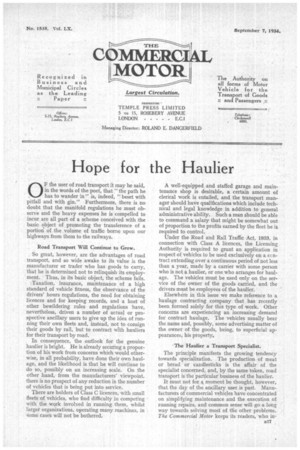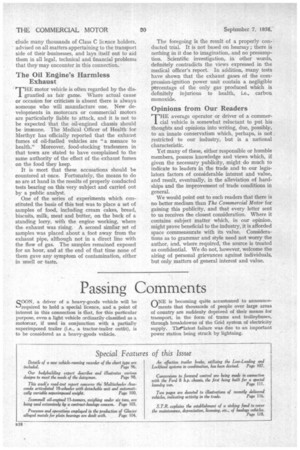Hope for the Haulier
Page 31

Page 32

If you've noticed an error in this article please click here to report it so we can fix it.
OF the user of road transport it may he said, in the words of the poet, that "the path he has to wander in". is, indeed, "beset with pitfall and with gin." Furthermore, there is no doubt that the manifold regulations he must observe and the heavy expenses he is compelled to incur are all part of a scheme conceived with the basic object of promoting the transference of a portiori of the volume of traffic borne upon our highways from them to the railways.
• Road Transport Will Continue to Grow.
. So great, however, are the advantages of road transport, and so wide awake to its value is the manufacturer or trader who has goods to carry, that he is determined not to relinquish its employment. Thus, in its basic object, the scheme fails.
Taxation, insurance, maintenance of a high standard of vehicle fitness, the observance of the drivers' hours regulations, the need for obtaining licences and for keeping records, and a host of other bewildering rules and regulations have, nevertheless, driven a number of actual or prospective ancillary users to give up the idea of running their own fleets and, instead, not to consign their goods by rail, but to contract with hauliers for their transport by road.
In consequence, the outlook for the genuine haulier is bright. He is already securing a proportion of his work from concerns which would otherwise, in all probability, have done their own haulage, and the likelihood is that he will continue to do so, possibly on an increasing scale. On the other hand, from the manufacturers' viewpoint, there is no prospect of any reduction in the number of vehicles that is being put into service.
There are holders of Class C licences, with small fleets of vehicles, whofind difficulty in competing with the work involved in running them, whilst larger organizations, operating many machines, in orrie cases will not be bothered. A well-equipped and staffed garage and maintenance shop is desirable, a certain amount of clerical work is entailed, and the transport manager should have qualifications which include technical and legal knowledge in addition to general administrative ability. Such a man should be able to command a salary that might be somewhat out of proportion to the profits earned by the fleet he is required to control.
Under the Road and Rail Traffic Act, 1933, in connection with Class A licences, the Licensing Authority is required to grant an application in respect of vehicles to be used exclusively on a ccntract extending over a continuous period of not less than a year, made by a carrier with some person who is not a haulier, or one who arranges for haulage. The vehicles must be used only on the service of the owner of the goods carried, and the drivers must be employees of the haulier.
Elsewhere in this issue we make reference to a haulage contracting company that has recently been formed solely for this type of work. Other concerns are experiencing an increasing demand for contract haulage. The vehicles usually bear the name and, possibly, some advertising matter of the owner of the goods, being, to superficial appearances, his property.
The Haulier a Transport Specialist.
The principle manifests the growing tendency towards specialization. The production of meat or bread or candlesticks is the affair of the specialist concerned, and, by the same token, road transport is the particular business of the haulier.
It must not for a moment be thought, however, that the day of the ancillary user is past. Manufacturers of commercial vehicles have concentrated on simplifying maintenance and the execution of running repairs, and common sense will go a long way towards solving most of tlie other problems. The Commercial Motor keeps its readers, who in elude many thousands of Class C licence holders, advised on all matters appertaining to the transport side of their businesses, and lays itself out to aid them in all legal, technical and financial problems that they may encounter in this connection.
The Oil Engine's Harmless Exhaust
THE motor vehicle is often regarded by the disgruntled as fair game. Where actual cause or occasion for criticism is absent there is always someone who will manufacture one. New developments in motorcars or commercial motors are particularly liable to attack, and it is not to be expected that the oil-engined chassis should be immune. The Medical Officer of Health for Merthyr has officially reported that the exhaust fumes of oil-fuelled vehicles are "a menace to health." Moreover, food-stocking tradesmen in that town are stated to have complained to the same authority of the effect of the exhaust fumes on the food they keep.
It is meet that these accusations should be countered at once. Fortunately, the means to do so are at hand in the results of properly conducted tests bearing on this very subject and carried out by a public analyst.
One of the series of experiments which constituted the basis of this test was to place a set of samples of food, including cream cakes, bread, biscuits, milk, meat and butter, on the back of a standing lorry, with the engine working, where the exhaust was rising. A second similar set of samples was placed about a foot away from the exhaust pipe, although not in a direct line with the flow of gas. The samples remained exposed for an hour, and at the end of that time none of them gave any symptom of contamination, either in smell or taste. The foregoing is the result of a properly conducted trial. It is not based on hearsay ; there is nothing in it due to imagination, and no presumption. Scientific investigation, in other words, definitely contradicts the views expressed in the medical officer's report. In addition, many tests have shown that the exhaust gases of the compression-ignition power unit contain a negligible percentage of the only gas produced which is definitely injurious to health, i.e., carbon monoxide.
Opinions from Our Readers
THE average operator or driver of a commercial vehicle is somewhat reluctant to put his thoughts and opinions into writing, due, possibly, to an innate conservatism which, perhaps, is not restricted to our industry, but is a national characteristic.
Yet many of these, either responsible or humble members, possess knowledge and views which, if given the necessary publicity, might do much to indicate to leaders in the trade and to our legislators factors of considerable interest and value, and result, eventually, in the alleviation of hardships and the improvement of trade conditions in general.
We would point out to such readers that there is no better medium than The Commercial Motor for gaining this publicity, and that every letter sent to us receives the closest consideration. Where it contains subject matter which, in our opinion, might prove beneficial to the industry, it is afforded space commensurate with its value. Considerations as to grammar and style need not worry the author, and, where required, the source is treated as confidential. We do not, however, welcome the airing of personal grievances against individuals, but only matters of general interest and value.




























































































